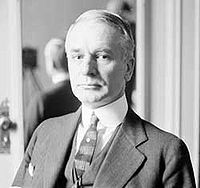Origins
The political basis for the Bretton Woods system was in the confluence of several key conditions: the shared experiences of the Great Depression, the concentration of power in a small number of states (further enhanced by the exclusion of a number of important nations because of the war).
Great Depression
A high level of agreement among the powerful on the goals and means of international economic management facilitated the decisions reached by the Bretton Woods Conference. Its foundation was based on a shared belief in capitalism. Although the developed countries' governments differed in the type of capitalism they preferred for their national economies (France, for example, preferred greater planning and state intervention (dirigisme), whereas the United States favored relatively limited state intervention), all relied primarily on market mechanisms and on private ownership.
Thus, it is their similarities rather than their differences that appear most striking. All the participating governments at Bretton Woods agreed that the monetary chaos of the interwar period had yielded several valuable lessons.
 The experience of the Great Depression was fresh on the minds of public officials. The planners at Bretton Woods hoped to avoid a repeat of the debacle of the 1930s, when intransigent insistence by creditor nations on the repayment of Allied war debts and reparations, combined with an inclination to isolationism, led to a breakdown of the international financial system and a worldwide economic depression. The "beggar thy neighbor" policies of 1930s governments-using currency devaluations to increase the competitiveness of a country's export products to reduce balance of payments deficits-worsened other nations' deflationary spirals, which resulted in plummeting national incomes, shrinking demand, mass unemployment, and an overall decline in world trade. Trade in the 1930s became largely restricted to currency blocs (groups of nations that use an equivalent currency, such as the "Sterling Area" of the British Empire). These blocs retarded the international flow of capital and foreign investment opportunities. Although this strategy tended to increase government revenues in the short run, it dramatically worsened the situation in the medium and longer run.
The experience of the Great Depression was fresh on the minds of public officials. The planners at Bretton Woods hoped to avoid a repeat of the debacle of the 1930s, when intransigent insistence by creditor nations on the repayment of Allied war debts and reparations, combined with an inclination to isolationism, led to a breakdown of the international financial system and a worldwide economic depression. The "beggar thy neighbor" policies of 1930s governments-using currency devaluations to increase the competitiveness of a country's export products to reduce balance of payments deficits-worsened other nations' deflationary spirals, which resulted in plummeting national incomes, shrinking demand, mass unemployment, and an overall decline in world trade. Trade in the 1930s became largely restricted to currency blocs (groups of nations that use an equivalent currency, such as the "Sterling Area" of the British Empire). These blocs retarded the international flow of capital and foreign investment opportunities. Although this strategy tended to increase government revenues in the short run, it dramatically worsened the situation in the medium and longer run.
Thus, for the international economy, planners at Bretton Woods all favored a regulated system, one that relied on a regulated market with tight controls on the value of currencies. Although they disagreed on the specific implementation of this system, all agreed on the need for tight controls.
Economic security
Also based on experience of the inter-war years, U.S. planners developed a concept of economic security - that a liberal international economic system would enhance the possibilities of postwar peace. One of those who saw such a security link was Cordell Hull, the United States Secretary of State from 1933 to 1944. Hull believed that the fundamental causes of the two world wars lay in economic discrimination and trade warfare. Specifically, he had in mind the trade and exchange controls (bilateral arrangements) of Nazi Germany and the imperial preference system practiced by Britain, by which members or former members of the British Empire were accorded special trade status, itself provoked by German, French, and American protectionist policies. Hull argued [U]nhampered trade dovetailed with peace; high tariffs, trade barriers, and unfair economic competition, with war...if we could get a freer flow of trade...freer in the sense of fewer discriminations and obstructions...so that one country would not be deadly jealous of another and the living standards of all countries might rise, thereby eliminating the economic dissatisfaction that breeds war, we might have a reasonable chance of lasting peace.